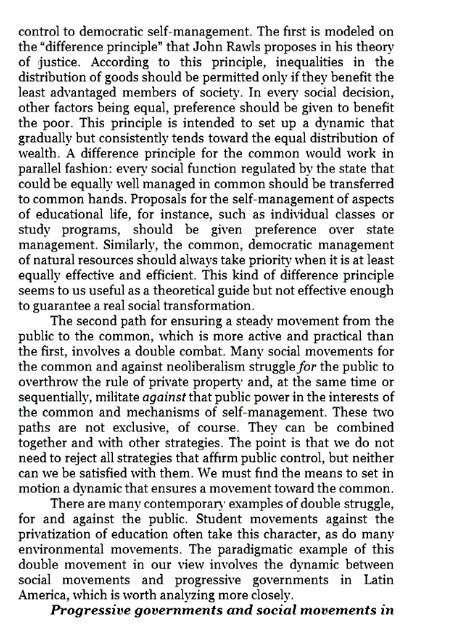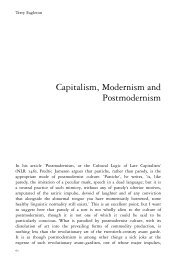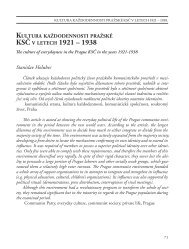Chapter 1: Subjective Figures of the Crisis ... - Negri in English
Chapter 1: Subjective Figures of the Crisis ... - Negri in English
Chapter 1: Subjective Figures of the Crisis ... - Negri in English
You also want an ePaper? Increase the reach of your titles
YUMPU automatically turns print PDFs into web optimized ePapers that Google loves.
control to democratic self-management. The first is modeled on<br />
<strong>the</strong> "difference pr<strong>in</strong>ciple" that John Rawls proposes <strong>in</strong> his <strong>the</strong>ory<br />
<strong>of</strong> justice. Accord<strong>in</strong>g to this pr<strong>in</strong>ciple, <strong>in</strong>equalities <strong>in</strong> <strong>the</strong><br />
distribution <strong>of</strong> goods should be permitted only if <strong>the</strong>y benefit <strong>the</strong><br />
least advantaged members <strong>of</strong> society. In every social decision,<br />
o<strong>the</strong>r factors be<strong>in</strong>g equal, preference should be given to benefit<br />
<strong>the</strong> poor. This pr<strong>in</strong>ciple is <strong>in</strong>tended to set up a dynamic that<br />
gradually but consistently tends toward <strong>the</strong> equal distribution <strong>of</strong><br />
wealth. A difference pr<strong>in</strong>ciple for <strong>the</strong> common would work <strong>in</strong><br />
parallel fashion: every social function regulated by <strong>the</strong> state that<br />
could be equally well managed <strong>in</strong> common should be transferred<br />
to common hands. Proposals for <strong>the</strong> self-management <strong>of</strong> aspects<br />
<strong>of</strong> educational life, for <strong>in</strong>stance, such as <strong>in</strong>dividual classes or<br />
study programs, should be given preference over state<br />
management. Similarly, <strong>the</strong> common, democratic management<br />
<strong>of</strong> natural resources should always take priority when it is at least<br />
equally effective and efficient. This k<strong>in</strong>d <strong>of</strong> difference pr<strong>in</strong>ciple<br />
seems to us useful as a <strong>the</strong>oretical guide but not effective enough<br />
to guarantee a real social transformation.<br />
The second path for ensur<strong>in</strong>g a steady movement from <strong>the</strong><br />
public to <strong>the</strong> common, which is more active and practical than<br />
<strong>the</strong> first, <strong>in</strong>volves a double combat. Many social movements for<br />
<strong>the</strong> common and aga<strong>in</strong>st neoliberalism struggle for <strong>the</strong> public to<br />
overthrow <strong>the</strong> rule <strong>of</strong> private property' and, at <strong>the</strong> same time or<br />
sequentially, militate aga<strong>in</strong>st that public power <strong>in</strong> <strong>the</strong> <strong>in</strong>terests <strong>of</strong><br />
<strong>the</strong> common and mechanisms <strong>of</strong> self-management. These two<br />
paths are not exclusive, <strong>of</strong> course. They can be comb<strong>in</strong>ed<br />
toge<strong>the</strong>r and with o<strong>the</strong>r strategies. The po<strong>in</strong>t is that we do not<br />
need to reject all strategies that affirm public control, but nei<strong>the</strong>r<br />
can we be satisfied with <strong>the</strong>m. We must f<strong>in</strong>d <strong>the</strong> means to set <strong>in</strong><br />
motion a dynamic that ensures a movement toward <strong>the</strong> common.<br />
There are many contemporary' examples <strong>of</strong> double struggle,<br />
for and aga<strong>in</strong>st <strong>the</strong> public. Student movements aga<strong>in</strong>st <strong>the</strong><br />
privatization <strong>of</strong> education <strong>of</strong>ten take this character, as do many<br />
environmental movements. The paradigmatic example <strong>of</strong> this<br />
double movement <strong>in</strong> our view <strong>in</strong>volves <strong>the</strong> dynamic between<br />
social movements and progressive governments <strong>in</strong> Lat<strong>in</strong><br />
America, which is worth analyz<strong>in</strong>g more closely.<br />
Progressive governments and social movements <strong>in</strong>










